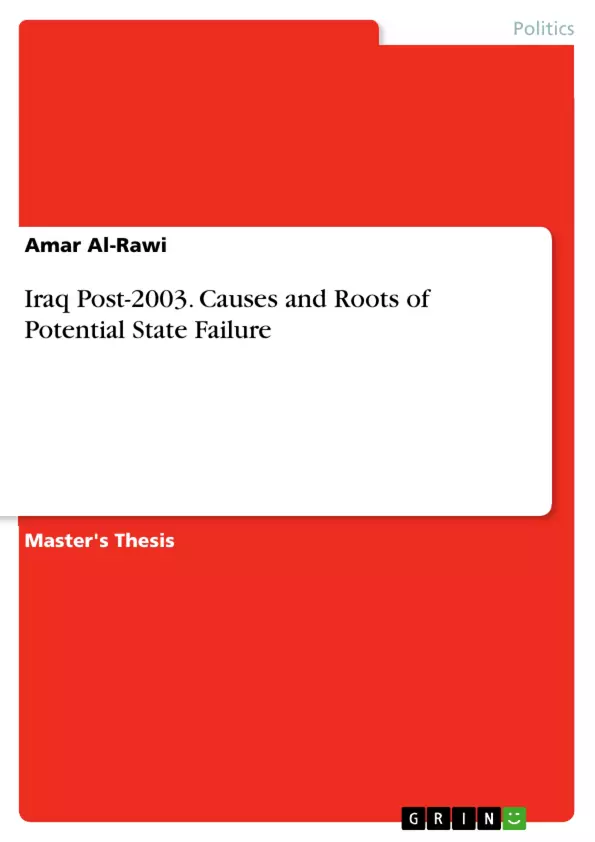The work is one of few studying the phenomena of failing states. The work investigates the underlying causes of a potential state failure in Iraq. Research and media reports have actively emphasised and studied the impact of the United States invasion of Iraq in 2003, with little consideration to the historical challenges of Iraq’s nation-building and identity. To understand Iraq’s challenges, the thesis analyses contemporary symptoms of failure in light of deeply rooted issues that have plagued the Iraqi state since its formation by the British mandate. Causal and process-based variables that were present in collapsed states are used to study the modern Iraqi state, linking the results to issues that predated the US invasion of Iraq in 2003. The results showed that the majority of the discussed contemporary threats to the Iraqi state can be traced to unresolved concerns and problems prior to the events of 2003.
Inhaltsverzeichnis (Table of Contents)
- Introduction
- Chapter 1 Statehood and State Failure
- State Legitimacy
- State Fragility and State Failure
- Failed States: Conceptual Limitations and Controversies
- Failed States Index
- Causes of State Failure
- Chapter 2 Causes of State Failure: The Case in Iraq
- An Inconsistent External Environment
- Steep Changes in the Economy
- Mobilisation of Identity Groups
- Reciprocal Assimilation between Political Elite
- Chapter 3 Iraqi Identity and Parallel Centres of Power
- The Role of Sub-Identities
- Parallel Centres of Power
- Conclusion
Zielsetzung und Themenschwerpunkte (Objectives and Key Themes)
The thesis aims to investigate the root causes of potential state failure in Iraq, focusing on historical challenges to nation-building and identity formation, rather than solely on the impact of the 2003 US invasion. The analysis examines contemporary symptoms of failure in light of deep-rooted issues that have plagued the Iraqi state since its creation.
- Historical factors contributing to state failure in Iraq
- The impact of external interventions on state stability
- The role of identity and conflict in Iraq
- The challenges of state-building in a post-conflict environment
- The interplay of political, economic, and social factors in state failure
Zusammenfassung der Kapitel (Chapter Summaries)
Chapter 1 examines the concept of statehood and state failure, discussing different theoretical perspectives and the limitations of existing frameworks. It also explores the "Failed States Index" and its relevance to understanding Iraq's situation.
Chapter 2 delves into the specific causes of state failure in Iraq, focusing on the context of the US invasion of 2003. It explores factors such as the inconsistent external environment, steep economic changes, the mobilization of identity groups, and the reciprocal assimilation between political elites.
Chapter 3 analyzes the complex interplay of Iraqi identity and the emergence of parallel centers of power. It investigates the role of sub-identities and the impact of these dynamics on state stability.
Schlüsselwörter (Keywords)
The thesis focuses on key concepts such as state failure, state-building, identity politics, external intervention, Iraqi history, nation-building, and political instability.
- Citation du texte
- Amar Al-Rawi (Auteur), 2022, Iraq Post-2003. Causes and Roots of Potential State Failure, Munich, GRIN Verlag, https://www.grin.com/document/1481775



